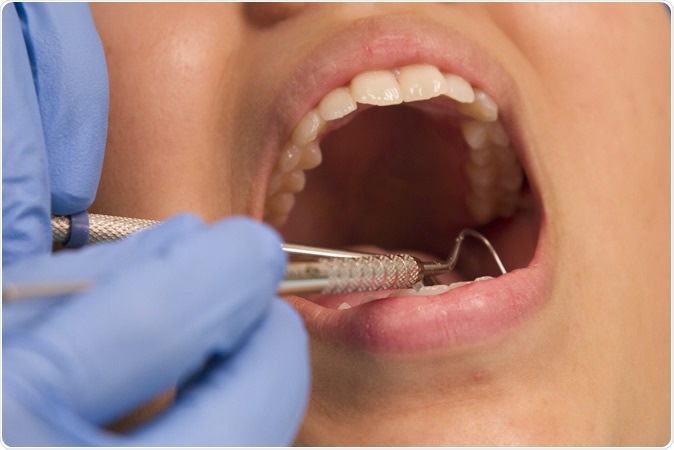A pair of new studies has revealed that gum diseases could be associated with a heightened risk of strokes and atherosclerosis of hardening of the arterial walls. The results of this new research are to be presented at the American Stroke Association's International Stroke Conference 2020 between the 19th and 21st of February 2020 in Los Angeles.

Dental exam. Image Credit: American Heart Association
According to the results of these two studies, there is a connection between gum diseases and atherosclerosis or hardening of the walls of the arteries. Atherosclerosis, on the other hand, raises the risk of strokes say the researchers. The team, however, warns that this study does not prove a "cause-effect" relationship between the two conditions, and thus results need to be interpreted carefully.
Dr. Souvik Sen, senior author of both studies and professor and chair of the Department of Neurology at the University of South Carolina School of Medicine in Columbia, in his statement, said, "Gum disease is a chronic bacterial infection that affects the soft and hard structures supporting the teeth and is associated with inflammation. Because inflammation appears to play a major role in the development and worsening of atherosclerosis or 'hardening' of blood vessels, we investigated if gum disease is associated with blockages in brain vessels and strokes caused by atherosclerosis of the brain vessels."
In the first study the titled, "Periodontal disease association with large artery atherothrombotic stroke," is slated for an oral presentation at the conference. It looked at 265 participants of an average age of 64 years. Of these 56 percent were men rest females. In the study, 49 percent of the participants were white, and others were of other ethnicities and racial origins. These participants had experienced a stroke between 2015 and 2017 explained the researchers. They looked at the association of the strokes with gum diseases in these individuals.
Results revealed that strokes in the large arteries of the brain were linked to intracranial atherosclerosis, and this was twice as common among those with gum disease. On the flip side, those with gum disease had three times raised risk of getting strokes involving arteries in the backs of their brains compared to others. These arteries are vital in controlling vision, balance, and coordination as well as other vital functions of the body. Gum diseases were not common among those who had a stroke due to blood vessel occlusion or blockage outside the skull. Large blood vessel strokes within the brain were associated with gum disease, however.
The second study is titled, "Role of periodontal disease on intracranial atherosclerosis," and it is also slated to be presented orally. In this study, the team of researchers included 1,145 participants who had never experienced a stroke. The average age of the participants was 76 years, and 55 percent of the participants were female. Of the participant group, 78 percent were white while others were of other racial origins. These participants belonged to a study group called the Dental Atherosclerosis Risk in Communities (DARIC) Study. For all the participants gum diseases were examined and documented in detail, and two sets of Magnetic resonance images (MRIs) of the brain were performed to look at the possible blockages within the brain. Those who had severe gum disease resulting in tooth loss were excluded from the study explained the team.
Results showed that in around 10 percent of the participants there was a severe blockage in one or more arteries of the brain. Severity was defined as a 50 percent or more blockage of the brain arteries. On analysis, it was noted that those with gingivitis and inflammation of the gums had a doubled risk of moderate to severe blockage and narrowing of arteries of the brain due to build up of plaque when compared to those with healthy gums. Overall the risk of blocked brain arteries was 2.4 times raised by gingivitis or inflammation of the gums after considering other risk factors such as the age of the patient, high blood pressure, and cholesterol of the patient.
Sen explained, "It's important for clinicians to recognize that gum disease is an important source of inflammation for their patients and to work with patients to address gum disease." He added, "We are working on a current study to evaluate if treatment of gum disease can reduce its association with stroke."
According to the Centres for Disease Prevention and Control (CDC), 7.8 million adults have had a stroke once in their lives, and this makes up for 3.1 percent of the total population. Atherosclerosis, high blood pressure, high cholesterol, diabetes, obesity, and other heart disease markers remain the top risk factors for stroke.